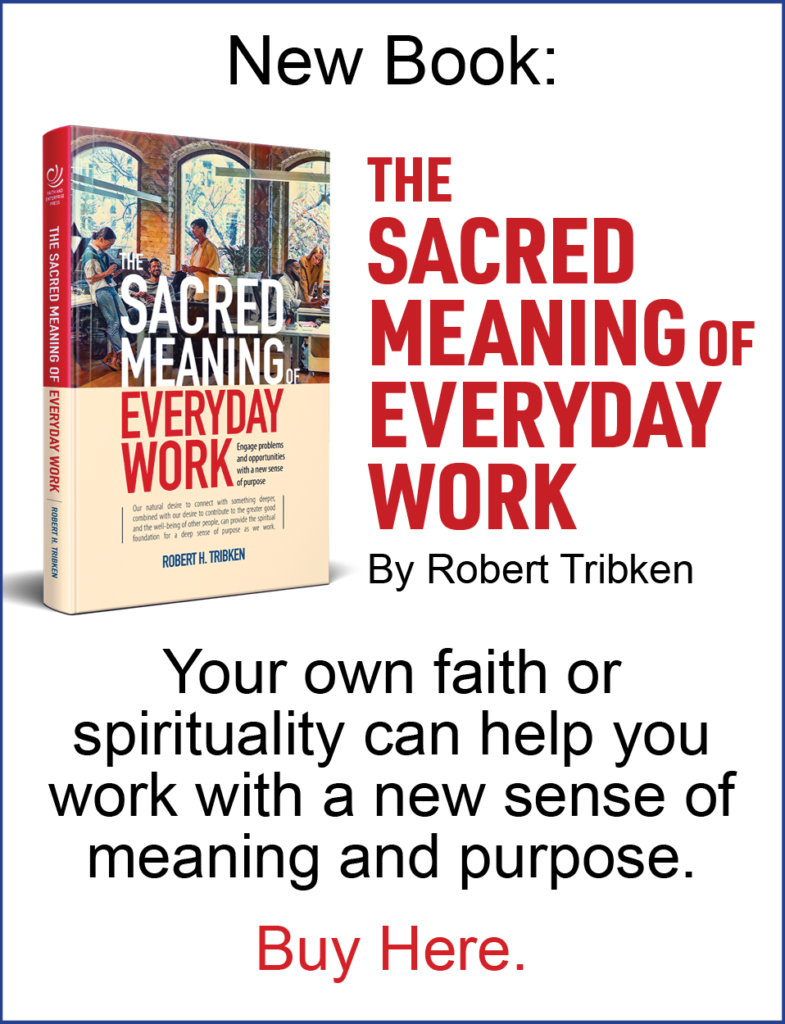Different Domain, Different Spiritual Needs
Most of us live our lives in multiple domains. By domain, I mean a field of endeavor that has its own rules, values, and objectives.
What we often overlook is that these different domains can trigger different spiritual needs. I believe churches and other religious institutions can play a very beneficial role by recognizing these spiritual needs and providing assistance.
Of course, there are essential values and needs that transcend different domains – the values of integrity, compassion, and community, and the need for meaning and purpose, as examples. But the varying aspects of each domain often mean that these are given different weights and suggest different spiritual practices.
The Domain of Work
Let’s look at the domain of work. The desire for deeper meaning is probably present throughout our lives, but the domain of work often adds complications. On the one hand, meaning and purpose are important motivators in the workplace and are crucial for the fulfillment we derive from our work. On the other hand, the emphasis on remuneration (we need to be paid) can sometimes overshadow the meaning we find.
Compare this to the family domain, where caring for children and other family members inevitably provides profoundly important and obvious meaning. Or the domain we enter when we are seriously ill and trying to recover; health and restoration develop new meaning.
Stress is another issue. While the most gut-wrenching stressors of our lives are probably related to family, health, and possibly financial catastrophe, the much more frequent and still potentially debilitating (think burnout) stressors are more likely to be work-related—deadlines, interpersonal conflict, poor job fit, and the risk of failure. These work-related stressors often require different coping strategies and call for different spiritual practices.
The pace and intensity of work also make special demands. To be effective at work, most of us need to be focused on the job at hand and find ourselves short of time. This makes it challenging to integrate spiritual practices that take considerable time from work.
Spiritual Practices for Your Worklife
Spiritual practices can play a critical role in our work lives if they address the domain-specific needs. There are practices that can help us stay focused and effective, remind us of the larger meaning of our work and lives, foster teamwork and compassion, and help us face stress and anxiety.
To play this role, however, they need to fit the domain of work. Most of us cannot afford to spend the better part of an hour in a religious practice during our workday; this would obviously not be realistic and would not respect our work and our work-related obligations. A proper regard for both spiritual practices and our work requires us to integrate them in a way that respects both.
The practices that will be most helpful will be those that flow with the rhythm of our work, while helping us deepen the spiritual connection we experience during the day.
We are each wired differently and approach both our work and our spiritual practices with our own predispositions, circumstances, and, of course, our own beliefs. Moreover, these factors change by day and maybe by hour; therefore, it is good to have several spiritual practices from which to draw. Most of us will find some practices more useful than others and will likely tend to return to a favorite practice or two, but we can still benefit from having several options available.
There are several practices that can be easily incorporated during the workday and should integrate well with the rhythms of our work. My intention in this article is to provide four examples, each of which can take very little time (less than a minute in a couple of cases), and then refer the reader to other resources to provide more options from which to choose. Readers are encouraged to experiment for themselves.
Examples of Spiritual Practices
Sanctifying the Workplace
Denise Daniels and Shannon Vandewarker, in their book Working in the Presence of God: Spiritual Practices of Ordinary Work, suggest walking through your place of work, praying before you start the workday:
Walking the hallways in prayer, saying a blessing over the office doors in your building, praying for the meeting rooms, the cafeteria, the production spaces within your workplace, the routes where the company cars drive, and asking God’s blessing over what happens there—these are all ways of recognizing your workplace as holy ground. And this recognition cannot help but change us and the ways in which we interact with our work and with our coworkers.
As a variation on this, when I enter my office doorway in the morning, I try to remember to say a prayer that reminds me of the potential sacredness of work and my purpose there. Practices like this help me remember that there is a higher reality and that our work might have significance beyond the obvious.
You can also reinforce the sense of the sacred at other times during the day. While it may feel awkward or inappropriate to pray loudly in a secular workplace, you can still visit the various places where you will be working and pray silently.
The Prayer Mantra
Over the years, I have found one of the most useful spiritual practices for me is one I call the prayer mantra. This practice has been beneficial whether the issue has been a minor hassle or a crisis large enough to keep me awake at night. I believe there can be something about the right mantra that can help us put the current crisis into a proper perspective, refocus and act with greater effectiveness, and stay spiritually grounded.
For our purposes, we can define a mantra as a short phrase or series of words used in prayer, meditation, or other spiritual practice. The term is sometimes used more generally in secular settings as a phrase that reminds one of an oft-repeated principle or goal (e.g., “our mantra is that the customer always comes first”), but in this discussion, I limit the use of the term to its more spiritual sense.
A mantra is often repeated continuously to lead one into a meditative state. A prayer mantra can be used in this way as well, but it can also be repeated once or twice as a quick prayer.
People sometimes think of mantras as Hindu or Vedic, and in fact, the word itself originates in Sanskrit, a language of ancient India. But most major religious traditions, including Christianity, have their own equivalents of mantras.
In some religious cultures, the sound of an adopted mantra is essential. Rhythm, alliteration, and rhyme can all contribute to the effect. For some, the effect is created primarily by the sound, not necessarily the meaning of the words.
In the West, and particularly within Christianity, the meaning and devotional aspect of the words take precedence. The sound can contribute, but the meaning of the words is the primary factor. Within the Christian tradition, mantras are directed toward God as a form of prayer.
To find a mantra, one can use a short, memorized passage of scripture or any other phrase that holds meaning for the individual (e.g., “praise God,” “thank you, Jesus”). It helps to have a mantra that has been used frequently and has become a habit.
The mantra that has been most effective for me is, “Thy will be done.” I think its power arises from how it addresses and turns my attention toward God and the divine mystery, reminding me of a higher, more powerful reality. The rhythm or cadence of the syllables also contributes to its calming and refocusing effect.
I recommend taking a few minutes to select a mantra for your own use. A favorite passage or expression might suggest some possibilities.
Spiritual Preparation for Meetings and Difficult Conversations
If you find yourself becoming annoyed, bored, or disengaged during a meeting, remind yourself that everyone in the meeting has dignity and special value. One way to think of this is that each person has been created in the image of God. This has implications for how we work with them.
A friend told me a story from his own work life that illustrates this:
Dave (a pseudonym) found himself dreading his weekly financial meetings. These were not pleasant events, especially since the business was not doing well and there was a lot of finger-pointing along with an undercurrent of blame and annoyance. One day, he prayed by himself before one of these dreaded meetings. He asked that God’s Spirit work through him and remind him that each person in the meeting was made in the image of God and should be treated accordingly.
This prayer, which he repeated over the following weeks, had a remarkable effect on his attitude and helped him engage the people in the meeting in a much more positive manner. Over time, this began to influence the attitude of the other participants as well. While the situation did not become miraculously perfect, the meetings did improve, and the participants became more engaged, positive, and cooperative. Dave no longer dreaded the meetings.
Others might use different theology, but no matter what language and theology you apply, saying a brief, silent prayer and remembering that the other participants have inherent value in God’s eyes can do wonders for our working relationships, especially if done before a meeting or a difficult conversation.
Breath Prayer or Meditation
A breath exercise, or breath prayer, is a simple yet effective way to calm ourselves and focus. It can be used on its own or as preparation for one of the other practices in this article. While as an exercise it can have physical benefits, it can also usher us into a prayerful, meditative state.
Here is one way to do it. Sit comfortably in a quiet place, with your eyes closed. Take a moment to say a short prayer, and then take a deep breath, noticing the sensation of air flowing in and out. After taking this one deep breath, breathe normally, observing your breath and noticing any associated sensations. Except for the first breath, do not change your breathing; the point is to observe your breath, not change it in any way. Just breathe normally and observe it dispassionately.
If your mind wanders, gently turn your attention back toward your breath without fighting the unwanted thoughts—just let them drift away on their own. As far as your mental activity goes, if you focus your attention on one thing—such as your breath—your unrelated mental activity will eventually begin to quiet down and your other thoughts will tend to drift away, as long as you do not give them energy by fighting them.
You can turn this into a prayer by turning your attention toward God, perhaps with a silent prayer of thanksgiving with each breath. You could also incorporate a prayer mantra. Some people imagine breathing out anxiety or tension and breathing in divine love or peace.
Other Practices
There are many other practices from which to choose. I include twenty in Chapter Six of my book, The Sacred Meaning of Everyday Work; most of these are short and suitable for the workplace, but some are longer and require more time (e.g., Lectio Divina, Passage Meditation, and the Examen).
You can also find a large number of practices in Denise Daniels and Shannon Vandewarker’s book Working in the Presence of God: Spiritual Practices of Ordinary Work, as well as online. It is beneficial to experiment and find the ones that seem most suitable for you; this could be a combination of practices tailored to different times and circumstances.


